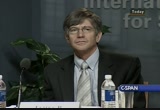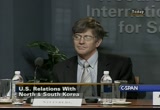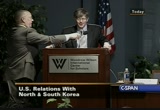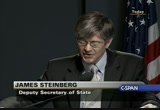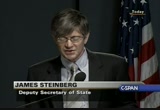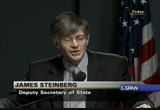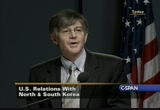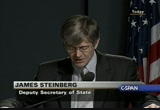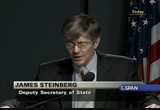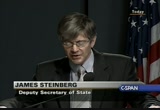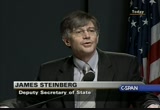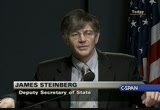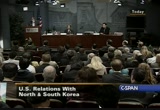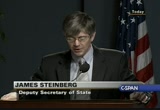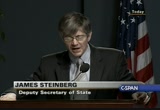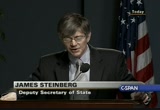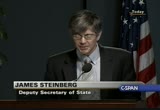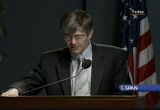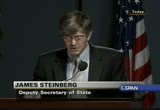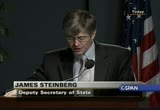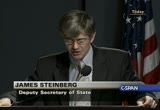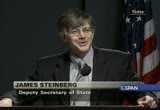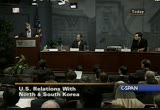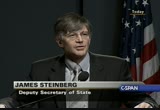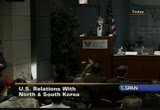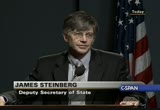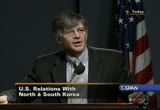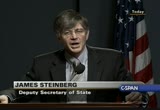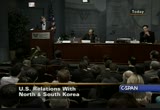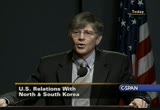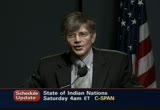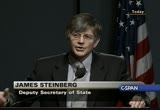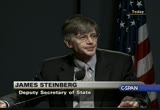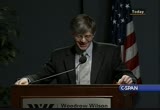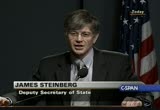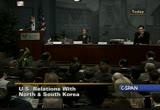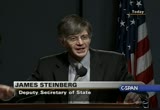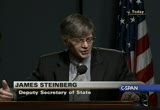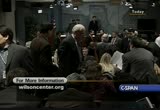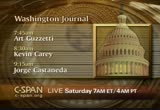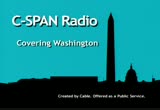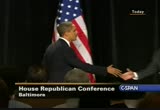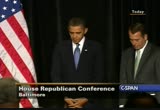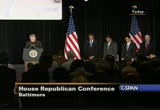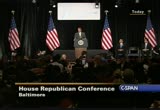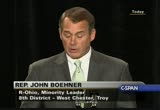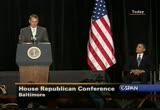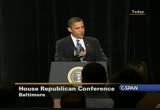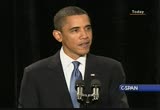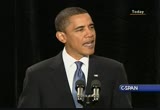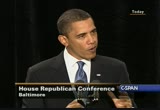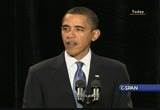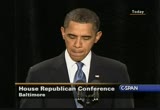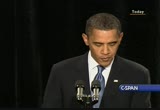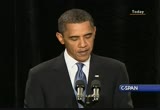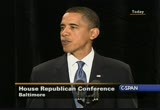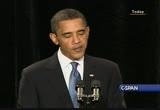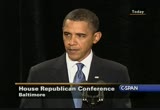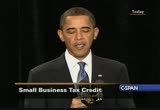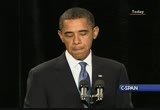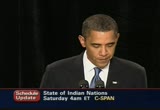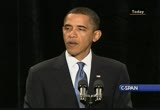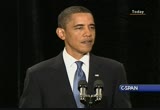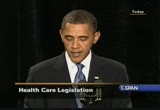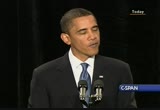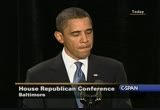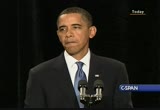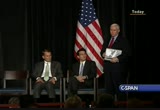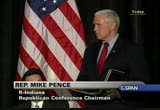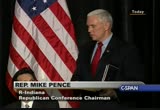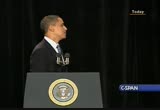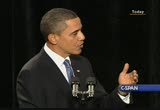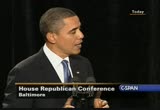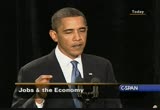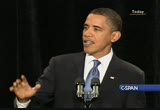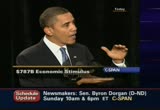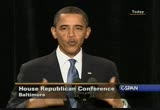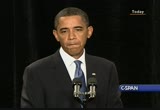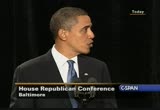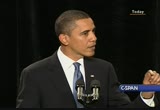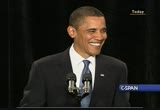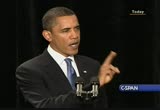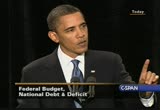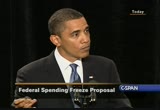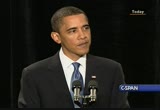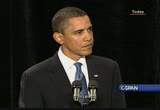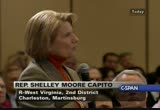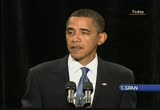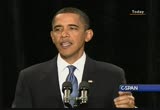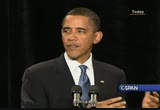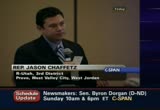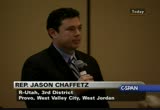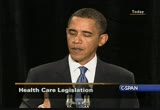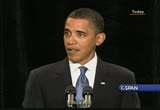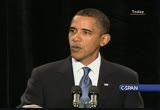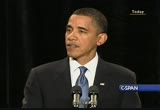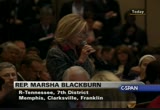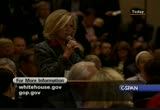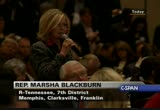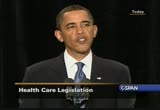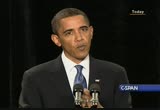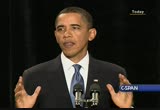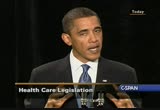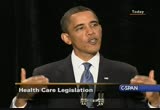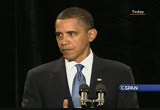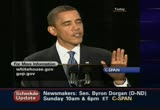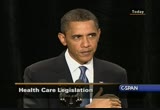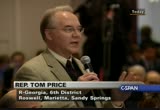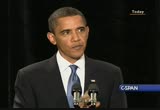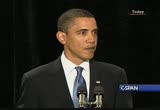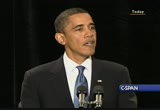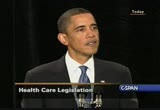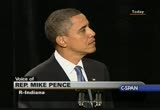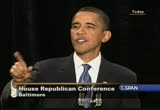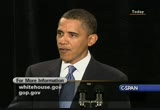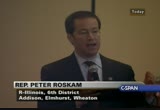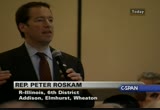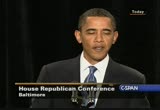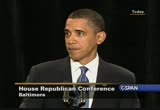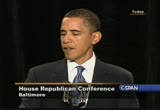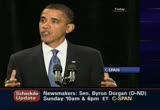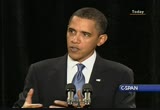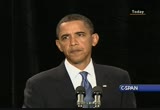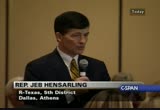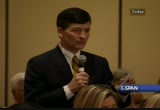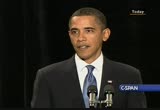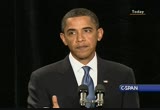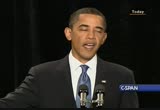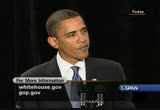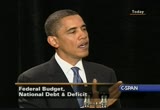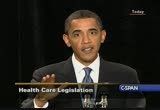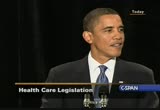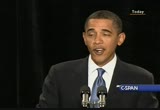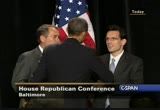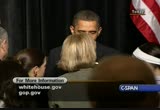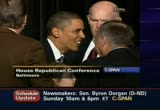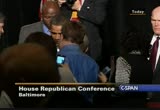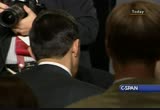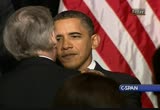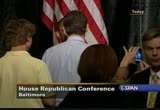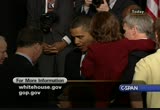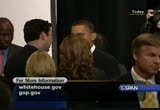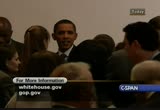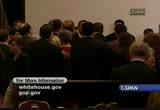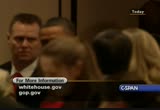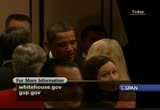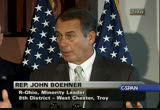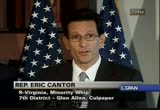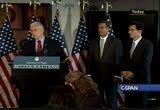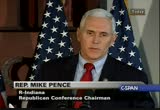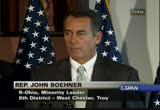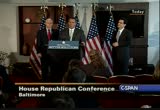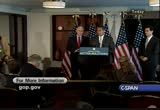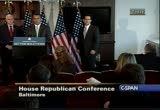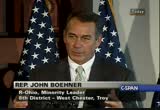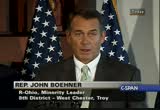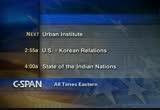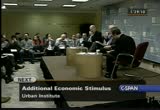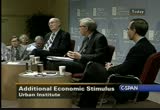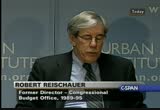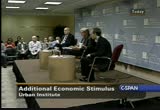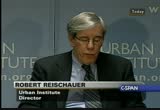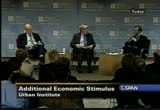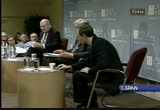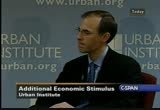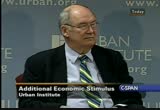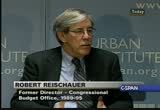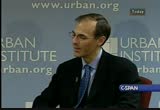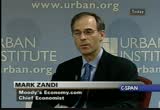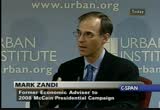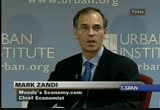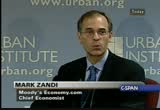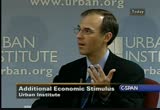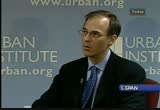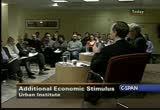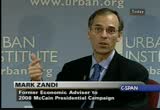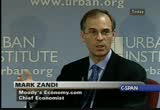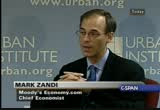tv Capital News Today CSPAN January 29, 2010 11:00pm-2:00am EST
11:00 pm
he was vice president and director for for policy studies at the brookings institution. during president clinton's administration, he served in numerous important and vital positions, among them deputy national security adviser, chief of staff to the u.s. state department, director of policy planning, and deputy and assistant secretary for analysis in the bureau of intelligence and research. . .
11:01 pm
>> he will moderate a q&a section. ladies and gentlemen, secretary of state james steinberg. [applause] >> thank you for that kind introduction. i want to pay tribute to you for your many decades of public service. you have been a model and inspiration to many. i am grateful for your good counsel and guidance in many capacities. it is a great pleasure to be here this morning. thank you to the wilson center and the university of north korean studies for hosting this event.
11:02 pm
as it only been one year? it seems a lot longer than that. it is a good way to mark this anniversary because it has been clear from the beginning of this administration, the importance of the administration in this region. it was almost exactly a year ago that the secretary -- you will recall her first trip to east asia. it reflected the importance that we attach to this region. as we continue our work in the coming years, we will look to the wilson center and our colleagues here today and most of you in the audience who are working on these issues for wisdom and insight going forward. it is a very timely moment for a conference on asian security in the korean peninsula. at this audience knows, 20 tent is an important year of
11:03 pm
anniversaries. -- 2010 is an important year anniversaries. peace has been a central consideration for the united states. even though our focus on the region has been in during, this is an inappropriate time for us to reflect on what has changed, as well as -- this is an appropriate time for us to reflect on what has changed. at the same time, it is a cautionary tale. the divergent paths persued by north and south korea. nations that are fully engaged in that respect the fundamental rights of their citizens prosper and progress. those that choose isolation and oppression do not. i do not need to remind this distinguished group of the remarkable story of south
11:04 pm
korea's achievement over the last 60 years. from the ravages of war, poverty, and early years of authoritarian government, south korea emerged as a vibrant, democratic, increasingly proper suit -- prosperous country. from its membership to its upcoming role as the host of g- 20, it has taken its place as one of the core players in the global economy. from its and the piracy -- anti- piracy, it has moved to consumer security to provider of security. turning its back on the globalize world and the basic freedoms allowed its citizens, despite the open hand offered by south korea and that international community, and despite its start compared with the south, to date its citizens
11:05 pm
regularly face the ravages of hunger, fear, and disease. they put the military first. its pursuit of nuclear weapons and ballistic missiles deepens its self-imposed isolation. i will discuss it in more detail in a few minutes. we hope the leaders will seize the chance to pursue a more peaceful relationship with the rest of the world, in the coming months. last week, we were marked the 50th anniversary of our security ties with japan. our bilateral alliances with south korea and japan, along with australia, thailand, and the philippines, could play a crucial role on maintaining stability throughout east asia. they provide an environment in which korea and other countries have had the chance to prosper. secretary clinton made clear in her speech to the weeks ago that these bilateral alliance is
11:06 pm
continue to provide the foundation for our engagement in the region. our security commitment has helped the region overcome what we academics called the security dilemma. it has largely avoided the destabilizing, allowing countries to grow, prosper, and integrate, in the context of reassurance rather than exile the and fear. it will be more important than ever as we work to overcome the challenges and seize opportunities on the korean peninsula today. our alliances must evolve to adapt to the changing environment, as the cold war paradigm has dominated our thinking for decades and is replaced by a more complex and potentially more optimistic set of relationships among the countries of northeast asia. we have been working hard with south korea and japan to update an enhanced our alliances in a spirit of partnership and a quality. it befits their own achievement
11:07 pm
over the past half century. this was very much on display during a very successful visit. they strengthened an already strong relationship. president obama reiterated his support for the korea-u.s. free trade agreement. he wants to build on and $83 billion trade relationship, our seventh largest trading partner. strengthen our bilateral bonds, bring new jobs to our workers. later this year, south korea will host the 2 +2 meeting. there will commemorate the 60th anniversary of the korean war and the progress and our alliance. one important part of this effort is the relocation of our troops. the headquarters of u.s. forces will move from downtown seoul to a new headquarters.
11:08 pm
over 100 u.s. military bases spread across a real will be consolidated around to group strategic cubs. this will transform our military footprint into a better position, without sacrificing our commitment to the alliance. we will continue to work together on updating our relationships to reflect our evolve alliance. this is an alliance which is increasingly global. we are appreciative of south korea's increasing willingness to expand its global role, commensurate with its achievement. on the whole range of issues, that will define the coming decades, for northeast asia and beyond. president obama and president li issued a joint statement. they looked for bilateral work.
11:09 pm
secretary general ban ki-moon embodies the strong values and ideals that bind the united states and the republic of korea on the global stage. as an active contributor to u.n. peacekeeping missions. most recently, it decided to offer 200 peacekeepers $10 million in emergency assistance to haiti. it is a key member of the anti- piracy task force. it has underscored its commitment to non-proliferation last year. we are appreciative of its role in iraq and now for announcing it will send a provincial reconstruction team to afghanistan. we welcome the announcement that the south korean government plans to triple its official development by 2015. south korea's development assistance has bought -- built still -- schools and hospitals.
11:10 pm
south korea is helping bring broadband infrastructure to african countries to ensure that, as they develop, they are integrated into the international community and not merely sub-pieces of development. we are looking forward to the g- 20 conference in seoul. seoul, south korea, has played an important role during the financial crisis by joining to insure swift economic reforms. similarly, we're working with our partners in japan to sustain our crucial alliance. a few days ago, i had a chance to reflect on those challenges and opportunities. today, i want to reiterate that we welcome the dialogue as exemplified by secretary clinton's recent meeting with the foreign minister in hawaii.
11:11 pm
as president obama said in his tokyo speech, the u.s.-japan alliance is not the historic berlin -- relic, but and abiding commitment to each other that is fundamental. it is essential that we work together to maintain the alliance and understanding of the japanese and american people, and that we implement a sound plan for sustaining our military problem -- military operation. the end of the cold war has brought with it the opportunity to supplement our security alliances with increasingly strong bilateral ties to the two other key nations of northeast asia, russia in china. with both of them, the obama administration has set out in new waters for more action- oriented partnerships that are necessary, if we are to overcome the challenges in northeast asia and around the globe. with russia, we hit the famed
11:12 pm
reset button. while this does not mean we are necessarily going to agree on every issue or resolve every source of tension in our relationship, we're making important progress. we are now close to concluding negotiations on a new treaty that will be an important step to the u.s.-russia relations. with china, we took important steps in institutionalizing our broader and more effective picture with the first strategic and economic dialogue held here in washington, d.c. last july. it is an arrangement that built on strong working ties between president obama and secretary clinton, and our chinese counterparts. those discussions reflected mutual understanding that we have in reflection of our most pressing challenges. nonproliferation, terrorism, pandemic disease -- there is little hope for progress, if we
11:13 pm
do not work together. as we look forward to the second meeting of the strategic economic dialogue in china next summer, we're having discussions at an -- on an unprecedented range of topics that we hope will ultimately yield action. more broadly, we are beginning our ties with other key parts of east asia, from are increasingly productive relationship with india to our corporation with asean. our bilateral relationships alone cannot achieve the kind of regional and global cooperation we need to meet the challenges of the 21st century. that is what secretary clinton has set forth her vision of how to deepen our bilateral engagement in east asia, to address transnational matters. as secretary gates observed several years back, the u.s. is a resident power in asia-
11:14 pm
pacific. the obama administration is determined to play an increasingly active role in working with the countries of the region. from our allies to emerging powers like india, indonesia, and china. we want to shape a peaceful, prosperous future for the billions who live in this increasingly central part of the world. this framework of security alliances, bilateral ties, and multilateral engagement provides the framework for which we approach the most urgent and dangerous challenge facing the region. it is the danger posed by north korea's nuclear missile program. there is a longer-term challenge a peaceful reintegration. let me conclude by saying a few words about our approach. we want to restart the six party talks and move toward the goals shared by our partners in those talks. from the beginning of the obama
11:15 pm
administration, we have made clear that the united states is prepared to engage diplomatically with north korea and at remain committed to the implementation of all elements of the 2005 joint statement of the six-party talks. these include verifiable denuclearization, a peace regime, normalization of relations, economic and energy cooperation. as president obama said, our message is clear, if north korea is prepared to take concrete and irreversible steps to fulfil its obligations and eliminate its nuclear weapons program, the united states will support economic assistance and help promote its full integration between the community of nations. that opportunity, in respect, will not come with threats and less -- those of the president's words. p'yongyang has expressed a desire to engage, but has not yet shown that it will take the concrete steps necessary to live
11:16 pm
up to those obligations. since agreeing to the 2005 joint statement, it has tested two nuclear devices, modernized, proliferated nuclear technologies and weapons, and engaged in provocative and destabilizing behavior. the international community and particularly our partners in the six-party talks have responded to these provocations firmly and clearly. the security council resolutions are important reflections of this determination. we have taken together unprecedented steps to implement them. the new measures include a ban on arms and related material exports in north korea and a major expansion of the ban on arms support, strict financial restriction, and enhance provisions for the inspection of cargo. last month, following close consultations, ambassador
11:17 pm
stephen bosworth led a delegation to p'yongyang. north korean officials expressed a willingness to resume the six- party talks. reaffirmed their commitment to the 2005 statement. did not reach an agreement on the specifics of when and how to proceed. the ambassador made it clear to the north koreans that concrete actions, through verifiable demilitarization is the sole way to improve relations. we believe it is important that the six-party talks resume expeditiously, and that north korea began to take those steps to eliminate its nuclear weapons program. in the meantime, either the united states -- neither the united states or our allies will provide material benefits to north korea simply to return to negotiations.
11:18 pm
the terms of the un security council resolution will continue to be enforced. our determination to see that enforcement was made clear in the recent seizure of arms and related materials from the north korea charter flight in thailand. that incident clearly demonstrated the result of the international community in countering proliferation of destabilizing technologies, in north korea especially. meanwhile, we continue to speak out clearly for the basic human freedoms and dignity to which all north koreans are entitled. secretary clinton's designation as a special envoy and recent travel to japan demonstrate the importance of this issue. secretary clinton has described the approach that our administration is taking and the ordination with our six-party partners. it does not mean we're doing nothing, on the contrary, we are
11:19 pm
working closely with our allies and partners in the region to offer north korea a different future. strategic patients means that north korea must live up to its commitments and obligations. there is a clear path open through the six-party talks and denuclearization to achieve the security that north korea says it seeks. but if returns to talks and begins to make progress, we will all be prepared to discuss, in bilateral talks, all the elements of negotiation, including, with our south korean partners, a peace regime for the korean peninsula. we will not be for the core nuclear issue. as secretary clinton has said, current sanctions will not be relaxed until they make irreversible steps towards complete denuclearization.
11:20 pm
they may -- they will not have -- the unity that we have seen in the past year with the unprecedented action by the u.n. security council and the cooperative implementation of sanctions has been an important achievement for the future of this process and for future cooperation in northeast asia, beyond this challenge. that is something i want to emphasize, that even as we work together on overcoming the very difficult challenge posed by north korea, we can take advantage of our joint action to build a new capacity for cooperation and collective action in a part of the world that will become more important in the years to come. our cooperation today is focused on denuclearization, but we are also paving the way for cooperation on a broader challenge of the opportunities in northeast asia and the entire pacific region in the years to come. thank you for your time.
11:21 pm
i look forward to your questions. [applause] >> thank you. the secretary has agreed to take your questions. the floor is open, but please wait for the microphone and please state your name. microphone. >> recently north korea demanded a peace treaty with the united states. before the six-party talks, what is the u.s. position on that? north korea -- i'm sorry. >> let me try to answer your question. i do not want to characterize
11:22 pm
the north koreans position, i will let them characterized their own position. as i said in my remarks, we believe that there is an appropriate time and place to discuss the issue of how we replace the arms going forward. the first step is to return to the six-party talks. within that framework, we have a clear path forward to discuss the full range of issues, including the potential for peace. as we do so, we will do this in close consultation with our south korean allies who are the principal parties in interest for any agreement of that sort. we accept the fact that there is inappropriate time and place for those discussions to take place -- there is an appropriate time and place for those discussions to take place. we want to implement their prior commitment from 2005. >> i would like to take some
11:23 pm
other questions. over there. >> what is your assessment of the chinese interest in engaging in the human rights part of the portfolio that you described? if you do assess it in a positive direction, how do you envision them taking some independent action along those lines? >> the chinese have made quite clear that they are concerned about stability in north korea. instability in north korea could affect their interests. we've been trying to encourage them to see that, the lack of human rights, it is appalling conditions in north korea contributing to those conditions. china is serious about wanting a diplomatic process to move forward. it should use in its own way, its influence to try and improve
11:24 pm
the situation of the people they're economically and politically. it is hard to judge whether the chinese are prepared to take on that role. sometimes the chinese do things without sharing their intentions with us. we will continue to make clear to them that, in their own interests, china ought to work with the north koreans to agree much better conditions of living for their people and to recognize the human situation that prevails in north korea is contrary to the interest of all of us and north korea's neighbors. >> the gentleman in the red. >> i am with the associated press. i do take into a back up -- how do you take into consideration the fact that they continue to make nuclear weapons? >> we take it as water under the bridge. north korea had made some
11:25 pm
progress in developing its nuclear program. we need to make sure that as we deal with this, we do not repeat what we saw in the past -- that is, rewards for actions which can be easily reversed. interim measures that do not lead to a significant resolution, not only do not achieve our national of objectives, but the objectives of our partners and our inducing be acres that are contrary to everyone's interest. while we remain concerned, we're working with china and others to make sure that they prosper. north korea continues to proceed in violation and will continue to suffer the consequences. that is what i mean by the fact that strategic does not mean absent. we are prepared to enforce vigorously the sanctions, until and unless north korea take meaningful steps to meet its obligations.
11:26 pm
>> thank you. >> bill jones. i would like to ask a question about relations with south korea. the south koreans have a very ambitious nuclear energy program and are considering the possibility of reprocessing nuclear fuel. there have been restrictions on that, dating back from 1976 legislation. just over the last couple of days, kurt campbell has indicated there would be a possibility of assisting this issue so there would be able to do that. what is the u.s. position on that issue? they have agreed to all of the non-proliferation restrictions, they're cooperating in every way. would it not be a possibility to allow them to do this reprocessing? >> as most of you know, the vice minister was here and i had the opportunity to have extensive discussions with him and his colleagues on this
11:27 pm
issue. we agreed that we have a very strong mutual interest in strengthening the goal of nonproliferation. there are concerns, as more countries news to develop nuclear power, about the risks of proliferation episode- associated with this. but we strongly for work -- and you heard the president very vigorously support our own interests in civilian nuclear power, we have to make sure it is done in a way that does not foster dangerous behavior. we are all very cognizant of the very real challenge not only from north korea, but from iran. as we move forward, we have to be cognizant of the impact of activities involved on the dangers of proliferation. we have agreed to work together on basic principle. however we strengthen our own national civilian nuclear power programs, we need to do it in a way that does not encourage a
11:28 pm
dangerous proliferation related behavior. we have an agreement with south korea, we are having discussions with them about how modern technology can be applied under that agreement. that court and shared understanding -- that core and shared understanding was a clear determination that whatever we do to enhance civilian nuclear power, we must be cognizant of the consequences. our discussions will take place on that shared understanding and we look forward to ways to see how we can adapt to their circumstance. >> thank you. let me take a question from one of our participants in the overflow room. the president said he wanted to meet with the north korean president kim jong-il this year. any comment on this? >> we strongly support president li and the very clear path he has set forward about what is necessary to
11:29 pm
achieve peace and stability on the korean peninsula. i am confident that, whatever form of engagement the south korean government chooses, we will do this in close cooperation and in the framework we have all agreed on. if south -- if north korea wants to make meaningful progress, it is going to need to return to the six-party talks. there is a strong sense of shared approach that characterized our relationships from the first phase of our administration. we are very supportive of the measures that he takes. we know we are pursuing a shared goal. >> thank you. the gentleman all the way in the back. >> i want to ask you about china's will -- role. how satisfied you on their current effort to persuade north korea? >> from the outside of the administration, we recognize that china is an important
11:30 pm
factor in the effort to achieve denuclearization of the peninsula. we have had intensive discussions. i'm quite convinced that the chinese share are strong conventions -- convictions that a nuclear north korea would be an enormous danger to all and very destabilizing to the region. we have a vigorous dialogue with china. there are many positive steps that china has taken to implement those things. there are issues we continue to work out together, as we try to resolve some of these ambiguities around particular transactions or activity. we have seen a clear indication on china's behalf that they take this seriously and understand the importance of standing -- sending a vigorous signal to north korea about nuclear
11:31 pm
recession. we continue the dialogue. >> the gentleman to rose down. >> thank you very much. what is the u.s. reaction to the military incident between the north and south? you mentioned the recent agreement with russia. many in moscow feel that it will no longer be part of the u.s.- russia agenda, is that true? >> we continue with the universal preoccupation of the united states to address those issues, within the framework of the dialogue that we have established with russia. it is one issue we continue to discuss and we think it is quite important for russia's own future to continue to offer its own people the benefits of an open society with open media and freedom to discuss and debate. that will be an important part of our relationship with the
11:32 pm
nature of the reset allows us to have these conversations without jeopardize in the overall relationship. we recognize that we will have areas of disagreement. we're not using this to say that we have no differences. we recognize that constructive partners can have differences, in the biggest differences on some issues, but still work together on common challenges like north korea and iran. i think that has been one of the positive results of the way we have approached the spirit we can have the differences and still work together. -- results of the way we have approached this. we can have the differences and to work together. we have been concerned about this and we think there are provocative. north koreans need to exercise restraint. -- the military activity has not crossed the boundary, but there are risks associated with the behavior. we urge the north koreans to restraint and refrain from that.
11:33 pm
>> thank you. the gentleman to the right here. >> in the past, our japanese friends have had various attitudes toward north korea, from promising substantial reparations, which were very big buy their formula -- and other times not wanting to engage with them until they had returned people who they had kidnapped. they have a new administration, which is good for our friends in the pentagon, who do not like democratic changes. my question is very simply, reducing the japanese stand on the various -- where do you think the japanese stand on the various positions to north korea? is it too early to tell how the very new japanese administration will approach these things? >> i will not agree with your
11:34 pm
characterization of the pentagon's view of our relationship with japan. we have had quite a good opportunity to discuss with the new government, its approach to north korea. it has been quite reassuring how much in sync we are on this question. there is no question that the humanitarian convention -- the about the japanese citizens is a concern, and why would it not be. we would be concerned about american citizens who are held in north korea. we do not see that as inconsistent. as many of you know, during our visit to tokyo, secretary clinton met with some of the families. we share their concern. we are also on the same wave length about the importance of moving forward on the six-party talks, the potential role of achieving denuclearization, and our common determination to take measures to strengthen our security alliance, including concrete security measures, so long as north korea continues in that direction if they're going
11:35 pm
to continue to test missiles and nuclear devices, we're want to continue to work with south korea and japan to provide defenses and deterrents against the dangers that north korea represents. there has been no confusion between us and the government in tokyo about that issue. >> i think we will wrap it up. we will go to one final question. [inaudible] [inaudible]
11:36 pm
>> i look back on the past year as a very positive year in u.s.- china relations. we have had an opportunity from the first weeks of this administration to signal the importance that we attach to u.s.-china relations to our strong commitment to a constructive and cooperative relationship, and to build on the positive development that had taken place in previous years to broaden and strengthen the relationship. it has been manifest from the first weeks since president obama's phone call. since april of last year, president obama visited china. we have differences on some issues and they have issues of difference with us. that is to be expected.
11:37 pm
we do not believe that overnight, would not believe these are going to wait -- go away. we have a responsibility to manage those issues and realize that these are critical issues. neither of us are born to be able to achieve our fundamental objectives without cooperation. their interest in sustaining there are economic growth depends on healthy global economics. it depends on corp. tween us and the other major economies of the world bridge and it is concerned -- it depends on cooperation between us and the other major economies of the world. we must deal with the common interest and problem of terrorism. with a common interest in global public health. these are all issues that we have provided a strong basis for the relationship. we have some differences and will hear more about those in coming days we can speak clearly and candidly about what our
11:38 pm
positions are in yet understand that our long-term interests are going to be achieved if we can work our way through these differences and find a way to go forward. i do not dispute that we will have some ups and downs, but that is the nature of these relationships in these circumstances. we're committed to working through them. we look forward to finding ways to build on the relationship in the upcoming second round of dialogue and it will be a good opportunity for us to do that. it is a very important perspective to keep in mind as we handle the issues going forward. thank you very much for your time. it has been a pleasure. thank you very much. [applause] >> we will now have a break.
11:39 pm
[captioning performed by national captioning institute] [captions copyright national cable satellite corp. 2010] >> president obama takes questions from the republican house members at their annual retreat. the urban institute looks at the polls -- possibility of a new stimulus bill. there is a discussion of u.s. relations with north and south korea at the woodrow wilson institute. you're watching c-span, created by cable, offered as a public service. >> on tomorrow's "washington
11:40 pm
journal,"we begin with a look at the president's high-speed rail plan. kevin carey will talk about the president's stated the union speech. jorge castaneda will discuss mexico's war on drug traffickers. we are live beginning at 7:00 a.m., here on c-span . >> saturday, the history of executive power from toward watching to george w. bush. the author talks about his book "crisis and command." that is part of our book tv weekend on c-span 2. in the nation's capital and across the country, listen to the radio. in washington at 90.1 fm and on xm radio. it is also a free map for
11:41 pm
iphone. seas and radio covers washington like no other. -- c-span radio covers washington like no other. >> the president spoke and this is an hour and 45 minutes. we welcome the decision by the leaders to open the event television. now the president. [applause] >> ladies and gentlemen, the president of the united states. [applause]
11:42 pm
[applause] >> let us pray. lord god of heaven and earth, father of us all, as we ask your spirit to bless this gathering, and all the great benefits you lay upon america's table, we cannot help but for our brothers and sisterspray -- help but pray for our brothers and sisters around the world. you are ever attended to every human need, and the greatest hunters of the human heart, for you alone are the lord god. for those who hunger for economic and and and security --
11:43 pm
and homeland security, grant freedom and trustworthy protections. for those families who are hungry for work and bright promise for their children, bring forth right management of time and talent and perseverance in continued education for the future. renew the nation in faith. remove the veil of cynicism and fear that inhibits your people possibility to be creative and industrious in common endeavors. blessed are president, the members of congress -- a bless our president, the members of congress, and those involved in our legislative branches. may we live in a true balance, be responsible to each other
11:44 pm
and to those they serve, and most of all to you, almighty god. may your discerning spirits live and move in our relationships, that we may recognize your presence in our midst and feed a hungry world searching for lasting meaning. lord, by seeing in the united states of america your free children working together, mayday in all the world give banks -- thanks and give you glory, now and forever, amen. >> amen. >> this is a serious time for
11:45 pm
our nation. it is a time for anxiety for millions of our fellow citizens. frankly, for many americans, it is a time of anger. they believe the government has stopped listening to them. the people are supposed to be in we hope to restore the bonds of trust, and we share the responsibility of listening to the american people. they are the ones who put us in power. in addition to listening to the people, we also need to listen to each other. it is in that spirit, mr. president, that we invite you here today, and we're very grateful that you have accepted. in january, 2009, i promised that the republicans would stand with you when we believe your policies were in the best interest of our country. when it came to afghanistan, iraq, charter schools, teacher quality -- we did just that.
11:46 pm
when we disagreed, as we have on some major issues, i said that republicans would not just be the party of opposition, but we would also be the party a better solutions. we formed solutions groups to many of those major areas. they produced detailed alternatives that we have presented throughout the last year to you, your ministration, into the democratic majority in congress. with compiled the summaries of these alternatives into a document we call "better solutions." it covers our proposals on everything from jobs and health care to government spending and transparency. mr. president, i am pleased today to present you with a copy of our better solutions. [applause]
11:47 pm
for those that will not have the president's copy, you can go to solutions.gop.gov and read them. we spend a lot of time listening to people. it is reflected in the work we have done. mr. president, we do not expect you to agree with us on every one of our solutions. we do hope that you and your administration will consider them. the battle of ideas is one of the hallmarks of a thriving democracy. we look forward to the dialogue that will take place today. we are really grateful that you have come. ladies and gentlemen, the president of the united states. [applause] >> thank you.
11:48 pm
thank you very much. thank you. thank you very much. thank you. thank you. thank you, john, for the gracious introduction. thank you for hosting me. thank you to all of you for receiving me. it is wonderful to be here. i want to acknowledge the president of the congressional institute and all the family members who are here and have to put up with us who are in elected office every day. i know that is tough. [applause] i very much am appreciative of the tone of your introduction and at the invitation that you extended to me. you know what they say, keep your friend's clothes, but visit the republican caucus every few
11:49 pm
months. [laughter] part of the reason i accepted your invitation was because i wanted to speak with all of you. not just to all of you. i am looking forward to taking your questions and having a real conversation in a few moments. i hope that the conversation we begin here does not in here. i hope we can continue our dialogue in the days ahead. it is important that we do so. it is important to you, i think, that we do so. it is important to the american people that we do so. i have said this before, but i'm a big believer, not just in the value of all the loyal opposition, but in its necessity. having differences of opinion and the real debate about matters of domestic policies, national security -- that is not something that is only good for our country, it is essential. it is only through the process of disagreement and debate that
11:50 pm
bad ideas get tossed out and good ideas get refined and made better. that kind of vigorous and back- and-forth, the imperfect but well-founded process that it often is, is at the heart of our democracy and makes us the greatest nation in the world. i want you to challenge my ideas and i guarantee you that, after reading this, and may challenge the view of yours. -- i may challenge a few of yours. i want you to stand up for belief, and knowing this caucus, i believe you will. the only thing i do not want -- and here i am, listening to the american people -- i think they do not want it either for washington to continue to be so washington. i know folks, when we are in town, they spend a lot of time reading the polls and looking at focus groups and interpreting
11:51 pm
which party has the upper hand in november in 2012, and so on and so on and so on. that is their obsession. i am not a pundit. i'm just the president. take it for what it is worth. i do not believe the american people want us to focus on our job security. they want us to focus on their job security. [applause] i do not think they want more partisanship or more obstruction. they did not send us to washington to fight each other in some sort of political cage match to see who comes out alive. that is not what they want. they sent us to washington to work together and get things done, to solve the problems they are grappling with every single day. i think your constituents would
11:52 pm
want to know that, despite the fact that it does not get a lot of attention, you and i have actually worked together on a number of occasions. there have been times when we have acted in a bipartisan fashion. i want to thank you you and your -- thank you you and your democratic -- thank you and your democratic reports for your effort. we have worked to break the taliban's momentum. there has been broad support for disrupting, dismantling, in defeating al qaeda. we're united in their admiration of our troops. -- we are united in our admiration of our troops. [applause] in may be difficult to understand that whatever divisions and differences may exist in washington, united states of america stands as one
11:53 pm
to defend our country. [applause] it is that same spirit of bipartisanship that made it possible for me to sign a defense contract and reform bill that was co-sponsored by senator mccain and members of congress here today. we stood gather -- we stood together to increase the largest increase in the va budget and more than 30 years that supported essential health care reform provide better access to medical care for those who served in uniform. some of you also joined with democrats in supporting a credit card bill of rights. it extends unemployment composition to americans who are out of work. some of you joined us in stopping tobacco companies from targeting children, expanding
11:54 pm
opportunities for young people to serve our country, and helping responsible owners stake in their homes. so, we have a track record of working together. it is possible. you mentioned -- on some very big things -- we have seen party-line votes. they were disappointing. let's start with our efforts to jump-start the economy last winter, when we were losing 700,000 jobs a month. our financial system teetered on the brink of collapse. the threat of the sec it -- of the second great depression looming large. i did not understand then and i still do not, why we got opposition in this caucus. there were badly needed tax cuts and cobra coverage for those who had lost jobs, they needed to keep the health insurance they desperately
11:55 pm
needed. there was opposition to putting americans to work on new construction progress. there was an interesting headline in cnn. americans disapprove of stimulus, but like every policy in it. there was a poll that showed that, if you broke down into its component parts, 80% approved of the tax cuts, the infrastructure, the insistence to the unemployed -- assistance to the unemployed. that is what the recovery act was. let's face it, some of you have been opposed to these important projects in your communities. i understand you have a philosophical differences on just the concept of government spending. as i recall, the opposition was declared before we had a chance to actually meet and exchange ideas. i saw that as a missed
11:56 pm
opportunity. i am happy to report this morning that we saw another sign that our economy is moving in the right direction. the latest gdp numbers show that our economy is growing by almost 6% -- the most since 2003. to put that in perspective, at this time last year, we were not seen positive job growth, we were seeing the economy shrank by about 6%. you have seen a 12% reversal during the course of this year. this turnaround is the biggest in nearly three decades. it did not happen by accident. it happened because of some of the steps we took. by the way, you mentioned the west side out here, you can look at the website that was eric cantor's idea. here's the point, these are
11:57 pm
serious times. what is required by all of us, democrats and republicans, is to do what is right for our country. even if it is not always what is best for our politics. i know it may be perce -- may be heresy to say this, but there are things that are more important than point number three people cannot accuse me of not living by my principles. we need an economy that less everybody up -- that lifts everybody up. it is more important than winning an election. our politics should be shaped by what is best for our future. no matter what is happening in the past, it is important for all of us to move forward together. we have issues right in front of us, on which i believe we should agree, because, as successful as we have been in spurring new
11:58 pm
economic growth, everybody understands that job growth has been lagging. every economist will say that jobs are a lagging indicator. that is no consolation for the folks who are out there suffering right now. there are 7 million americans who have lost their jobs in this recession and we have to do everything we can to accelerate it. today, in line with what i said at the state of the union, i propose a new jobs tax credit for small business. here's how would work, employers would get a tax credit of up to $5,000 for every employee they add in 2010. they get a tax break for increases in wages as well. we would refund part of your payroll tax. it is a simple concept and easy to understand join me and let's
11:59 pm
get this done. let's take some of bailout money that the wall street banks return and use it to help community banks start lending to small businesses again. i am confident we can do this for the american people. there is nothing in the proposal that is contrary to the ideological dispositions of this caucus. the question is what is going to keep us from getting them done. i propose a modest fee on the nation's largest banks and financial institutions to fully recover the taxpayer cost money -- the taxpayer money they provided to the financial sector. it is designed to discourage them from taking reckless risks in the future if you listen to the american people, they will tell you they want their money back.
12:00 am
12:01 am
senate yesterday. -- i am going to establish this executive order. i hope that you participate in that effort if we are going to actually deal with this, everybody knows that we are going to have to do it together. the idea of a bipartisan fiscal commission to confront the deficit in the long term died in the senate the other day. i'm going to establish such a commission by executive order and i hope that you participate, fully in genuinely, in that effort, because of we're going to actually deal with our deficit and debt, everybody here knows that we're going to have to do it together, republican and democrat. no single party is going to make the tough choices involved on its own. it is going to require all this doing what is right for the american people. and as i said in the state of the union speech, there is not
12:02 am
just a deficit of dollars in washington, there is a deficit of trust. i hope you will support my proposal to make all congressional earmarks public before they come to a vote. let's require lobbyists to exercise its influence to publicly disclose all their contacts on behalf of their clients, whether their contacts with my administration or contacts with congress. let's do the people's business in the bright light of day, together, republicans and democrats. i know how bitter and contentious issue of health insurance reform has become. i will eagerly look at the ideas and better solutions on the health care front. if anyone here truly believes our health insurance system is working well for people, i respect your right to say so but i just do not agree. neither would millions americans with pre-existing conditions to can get coverage today or find out they lose
12:03 am
their insurance just as they're getting seriously ill. that is exactly when you need insurance. for too many people, they're not getting it. i do not think a system is working when small business are gouged and 15,000 americans are losing coverage every single day, when premiums have doubled and out of pocket costs have exploded and they are poised to do so again. i mean, to be fair, the status quo was working for the insurance industry, but it is now working for the american people. it is not working for our federal budget. it needs to change. this is a big problem, and all of us are called on to solve it. and that is why, from the start, i sought out and supported ideas republicans. i even talked about an issue that has been the holy grail for a lot of you, which was to
12:04 am
reform commands that i would be willing to work together as part of a comprehensive package deal with it. i just did not get a lot of novels -- nibbles. greeting a high risk pool for uninsured folks with pre- existing conditions, that was not my idea, that was senator mccain's. i supported it and got incorporated into our approach. allowing insurance companies to sell coverage across plans to add choice and competition and bring down costs for consumers, that is an idea that some of u.s. suspect included in this better solutions, that is an idea that was incorporated into our package. i support it, provided that we do it hand in hand with broader reforms that protect benefits and protect patients and protect the american people. a number of you have suggested creating pools were self- employed and self businesses could buy insurance. that was a good idea. i embrace it. some of you supported efforts to provide insurance to children and let kids remain covered on their parents' insurance until they're 25 or 26. i supported that. that is part our package. i supported a number of other ideas, from and said a blazing well as to create an affordable catastrophic insurance option
12:05 am
from people who came from republicans like mike enzi and olympia snowe and i am sure from some of you as well. when you say i got to be willing to accept republican ideas on health care, let's be clear. i have. bipartisanship, not for its own sake but to solve problems, that is what our constituents, the american people need from us right now. all this then have a choice to make. we have to choose whether we are going to be politicians first or partners for progress, whether we're going to put success at the polls ahead of a lasting success we can achieve together for america. just think about it for a while. we do not have to put it up for about today. let me close by saying this. i was not elected by democrats or republicans, but by the american people. that is especially true because
12:06 am
the fastest-growing group of americans are independence. that should tell us both something. i am ready to eager -- ready and eager to work with anyone who was willing to proceed in the spirit of goodwill. but understand, if we cannot break from partisan gridlock, if we cannot move past the politics of know, if resistance supplants constructive debate, i still have to meet my responsibilities as president. i have got to act for the greater good because that is a commitment that i have made. that too is with the american people sent me to washington to do. i am optimistic. i know many of you individually. the irony, i think of our political climate right now is that, compared to other countries, the differences between the two major parties on most issues is not as big as it is represented.
12:07 am
but we have gotten caught up in the political game in a way that is not healthy. it is dividing our country in ways that are preventing us from meeting the challenges of the 21st century. i am hopeful the conversation we have today can reverse that. so thank you very much. thank you, john. [applause] i would like to open it up for questions. >> the president has agreed to take questions and members would be encouraged to raise your hand while you remain in your seat. [laughter] the chair will take the brunt of to make the first remarks. mr. president, welcome back to the house republican conference. >> thank you. >> we're pleased to have your return. [inaudible] a year ago, house republicans said then we would make you two promises.
12:08 am
that most of the people in this room and their families would prefer you and your beautiful family just about every day for the next four years and i want to assure you we are keeping that promise. >> i appreciate that. >> our pledge to you was that door is always open. we hope [inaudible] of our invitation that [inaudible] .
12:09 am
several of us in this conference on the way to baltimore stop by the salvation homeless facility in baltimore. i an african-american boy in a great name david carter, jr.. when he heard i would be seeing you, his eyes lit up like i had never seen. i told him if he wrote you a letter i would be giving it to you and i have. i had a conversation with david jr. and david senior. his family has been struggling with the economy. his dad said words to me that it will never forget. about my age and he said, congressman, it is not like it was when we were coming up. he said, there is no jobs. now, last year about the time you met with us, unemployment was 7.5% in this country. your administration, and your party in congress told us that we would have to borrow more than $700 billion to pay for a so-called stimulus bill. it was a piece build list of projects and boutique tax cuts, all of which we were told had to be passed or unemployment would go to 8% as your administration said. unemployment is 10% now as you well know. here in baltimore is considerably higher.
12:10 am
republicans offered a stimulus bill at the same time. the cost half as much as the democratic proposal in congress, and using your economic analyst models, it would have created christ the jobs -- twice the jobs at half the cost. it was across the board tax relief. you have come to baltimore today and you have raised this tax credit, which was last promoted by president jimmy carter. but the first question i would pose to you, very respectfully, mr. president, is, would you be willing to consider embracing in the name of david carter, jr., and his dad, in the name of every struggling family in this country, the kind of across-the- board tax relief that republicans have advocated, that president kennedy advocated, that president reagan advocated, and that has always
12:11 am
been the means of stimulating broadbased economic growth? >> well, there was a lot packed into that question. [laughter] first of all, let me say i already promised i would be running back to that young man and his family and i appreciate you passing on the letter. >> thank you. >> but let's talk about the jobs environment generally. you're absolutely right that when i was sworn in, the hope was that unemployment would remain about 8% or in the% range. that was based on the estimates made by both conservative and liberal economists, because at
12:12 am
that point on all the data had trickled in. we have lost 650,000 jobs in december. i am assuming you're not faulting with policies for that. we had lost, it turns out, 700,000 jobs in january, the month i was sworn in. i am assuming it was not my administration's policies that accounted for that. we lost another $65,000 -- 650,000 jobs the subsequent month, before any of my policies have gone into effect. i'm assuming that was not asçzik consequence of our policies,ñiñ that does not worth that --ñi õhat does not reflect the failure of the recovery act. the point being that what ended up happening was that the job losses from this recession prove to be much more severe, in the first quarter of last year
12:13 am
going into the second quarter of lastñr year than anybody anticipated. so i mean, i think we can score political points on the basis of the fact that we underestimated how severe the job losses were going to be. but those job losses to place before any stimulus, whether it was the ones that you guys have proposed or the ones that we proposed, could have everñi takn into affect. now, that is justified -- just the fact, mike, i did not think anyone would dispute that. you could not find an economist who would dispute that. at the same time, as i mentioned, most economists,
12:14 am
republican and democratic, liberal and conservative, would say that had it not been for the stimulus package that we passed, things would be much worse. now, they did not fill a 7 million hole in the number of people who were unemployed. they probably account for 2 million which means we have 5 million folks in there that we have still got to deal with. that is a lot of people. çóthe package that we put together at the beginning of the year, the truth is, should have reflected -- and i believe reflected what most of you things. this nop radical package is just not true. one-third of them more tax cuts and they were not -- when you say they were boutique tax cuts, mike, 95% of working americans got tax cuts, small businesses got tax cuts, large businesses got help in terms of their depreciation schedules. $jup, cuts.
12:15 am
a third of it was stabilizing state budgets. there is not a single person in here who, had it not been for what was in the stimulus package, would not be going home to more teachers laid off, more firefighters laid off, more cops laid off. a big chunk of it was unemployment insurance and cobra, just making sure that people had some floor beneath them, and, by the way, making sure that there was enough money in their pockets that businesses had some customers. you take those two things out, that accounts for the majority of the stimulus package. are the people in this room who think that was a bad idea? a portion of it was dealing with the empty -- amt, the alternative minimum tax, not a proposal of mine, that is not a consequence of my policies that we have a tax system where we could -- keep on putting off a
12:16 am
potential tax hike that is embedded in the budget that we have to fix each year. that cost about $70 billion. and then the last portion of it was infrastructure which, as i said, a lot of you have gone to appear at ribbon cuttings for the same projects that you voted against. i say all this not to really getñi the past, but it is simply to say that the component parts of the recovery act are consistent with what many of you say are important things to do. rebuilding our infrastructure, axd tax cuts for families and businesses, and making sure that we were providing states and individual some support when the roof was caving in. ñixdand the notion that i would somehow resist doing something that costs half as much but
12:17 am
would produce twice as many jobs, why would i resist that? i would not. i mean, that is my point. i am not an ideologue. i am not. it does not make sense if somebody could tell me you could do this cheaper and it increased results i would not say great. the problem is, i could not find credible economists who would back up the claims that you just made. now, we can -- here is what i know going forward, though. we are talking -- we were talking about the past. we can talk about this going forward. i have looked at every idea outr there in terms of the accelerating job growth to match the economic growth that
12:18 am
has already taken place. the jobs credit that i am discussing right now is one that a lot of people think would be the most cost-effective way for encouraging people to pick up their hiring. there may be other things that you guys have. i am happy to look at them,ñi ad i'm happy to embrace thpq i suspect i will embrace some of them. some of them i have already embraced. ourselves as we move forward, are we going to be examining each of these issues based on what is good for the country, what the evidence tells us, or are we going to be trying to position ourselves so that come november, we're able to say,ñi the other party, it is their fault. çóñiif we take the laqq) approar
12:19 am
then we are probably not going to get much agreement. if we take the former, i suspect there is going to be a lot ofñiñi overlap. all right? >> will you consider supporting the across-the-board tax relief, as president kennedy did? >> here is what i am hoping to do. -- here is what i am going toñr do, mike. what i am going to do is i'm going to take a look at what you guys are proposing a. the reason i say this, before you say ok, i think it is important to know. what you may consider across the board tax cuts could be, for example, greater tax cuts for people who are making a billion dollars. i may not agree to a tax cut for warren buffett. you may be calling for an across the board tax cut for the banking industry right now. i may not agree to that. so i think that we have got to look at what specific proposals you are putting forward and, this is the last point i will make.
12:20 am
if you are calling for across- the-board tax cuts, and on thexd other hand saying we are somehow going to balance our budget, i'm going to want to take a look at your math and see how that works, because the issue of deficit and debt is another idea where there has been a tendency for someçó inconsistent statements. how was that? all right? >> thank you, mr. president. >> thanks for agreeing to except our invitation. it is a real pleasure and honor to have you with us here today. ñiñiñi>&s this your crew right here, by the way? >> it is. this is my daughter liza and my son sam and charlie and this is my wife janna.
12:21 am
>> hey, guys. >> say hi. [laughter] i serve as a ranking member of the budget committee so i'm going to talk a little budget if you do not mine. the spending bills they have signed into law, the domestic discretionary spending has been increased by 84%. you want to freeze spending at this elevated beginning next year. that means that total spending in your budget would grow at 31 hundreds of 1% less than otherwise. i would submit that we can do more and start now. you have also said that you want to take a scalpel to the budget and go through it line by line. i want to give you that scalpel. i have a proposal with my home state senator, russ feingold, a bipartisan proposal to create a constitutional version of the line item veto. problem is, we can i get a vote on the proposal. why not start freezing spending now and would you support a line-item veto in helping us get a vote on it in the house? >> a me respond to the specific
12:22 am
questions but i want to push back a little bit on the underlying premise about as increasing spending by 84%. i talked to peter or sec before it came here because i suspect i would be hearing this argument. the fact of the matter is, most of the increases in this year's budget, this past year's budget, were not as a consequences of policies that we initiated, but instead were built in as a consequence of the automatic stabilizers that kick inñi because of this enormous recession. so the increase in the budget "'$"ájtpár+qp) was actually predicted before i was even sworn into office and hadxdñrñi
12:23 am
initiated any policies. dsiñr not know that -- do not tk it will dispute that, whoever was in there would have seen the same increases because of, on the one hand, a huge drops in revenue, but at the same time, people were hurting and needed help. ñiand a lot of these things hapn automatically. [ñnow, the reason i am not proposing the discretionary freeze taken to affect this year, we prepared a budget in 2010 -- for 2010, it is now going forward, is, again, i am just listening to the consensus among people who know the economy best. and what they will say is that if you either increase taxes ori significantly lower spending when the economy remains somewhat fragile, then that would have a distillate of -- destimulative effect and potentially would see folks losing business, more folks
12:24 am
potentially losing jobsìthat woe economy has not fully taken off. that is why i have proposed toxd do it for the next fiscal year. that is point no. 2. with respect to the line item veto, i actually -- i think there is not a president out there that would not love to have it. and i think that this is anñi area where we can have a serious conversation. i know it is a bipartisan proposal by you and rusóc6 c1 feingold. i do not like being held up with big bills that have stuff in them that are wasteful, but i've got to sign because it is a defense authorization bill and iñiñr have got to make sure thai
12:25 am
our troops are getting the funding that they need. ñiçói will tell you, i would loe for congress itself to showed i think one thing that youñr hae to acknowledge is you have to acknohat the earmarkave problem is not unique to one party. you get a lot of push back when you start going after specific projects of any one of you in your district. wasteful spending is usually spent some outside of your district. having noticed that? the spending in your district seems to be seem -- tends to seem pretty sensible. çói would love to seeñi more restraint within congress. i would love to work on the earmark reform that i mentioned in terms of putting earmarks online because sunshine is the best disinfectant. i am willing to have a serious conversation on the line-item veto issue. >> i would like to walkñr you through that, because we have a version we think is constitutional. >> let me take a look at it. >> i would say thatñr automatic stabilizer spending is mandatory suq'ding. ñrthe discretionary spending, ti
12:26 am
bills that congress signs that you sign into law, that hasñiñri increased 84%. >> will have a longer debate on the budget numbers, all right? >> thank you for joining us. as you said in your state of the union address, jobs and the economy are number one. ñiçói agree with you on that. ñii represent their state of wet virginia. we have a lot of coal and a lot of natural gas. my miners and the folks that are working and those are -- who are unemployed are very concerned by your policies in these areas, cap and trade, an aggressive epa, and the looming prospect of higher taxes. ñrin our minds, these are job killing policies. i'm asking you if you would be willing to add some of these
12:27 am
policies with the highest unemployment and the ensure economy that we have now, to assure west virginians that you are listening. >> i listen all the time including to your governor who is somebody who i enjoyed working with a lot before the campaign and now that i am president. know that the west virgin -- that west virginia struggles with unemployment and i know how important coal is to estrogen and a lot of our natural resources there. that is part of the reason i have said we need a comprehensive energy policy that sets up for long-term picture. for example, nobody has been a bigger promoter of clean coal technology that i am. testament to that, and it -- i ended up being in a whole bunch of advertisements that you guys all all the time about investing in ways for us to burn coal more cleanly. i have said i am a promoter of nuclear energy.
12:28 am
something that i think that over the last three decades has been subject to a lot of partisan wrangling and ideological wrangling. i do not think it makes sense. i think that that has to be part of our energy mix. i have said i am supportive and i said this two nights ago at the state of the union, that i am in favor of increased production. if you look at the ideas that this caucus has, again, with respect to energy, i am for a lot of what you said you are for. the one thing that i have also said, though, and here we have a serious disagreement and my hope is that we can work through these disagreements, there is going to be an effort on the senate side to do so on a bipartisan basis, is that we have to plan for the future. and the future is that clean energy, cleaner forms of energy are going to be increasingly important, because even if books are still skeptical in
12:29 am
cases about climate change in our politics and in congress, the world is not skeptical about it. if we're going to be going after some of these big markets, they will be looking to see, if the u.s. is the one that is developing clean coal technology? technology? -- is the united states going to lead in electric cars? what i want to do his work with west virginia to figure out how we can seize that future. but to do that, there has to be some transition. we cannot operate the coal industry in the united statesñi as if we are still in the 1920's or the 1930's or the 1950's.
12:30 am
we have to think about what that industry thinks -- looks like in the next 100 years. it will be different. that means that there will be some transition and that is where a well thought out policy of incentivize in the new while recognizing there will be a transition process, and we are not suddenly putting the old out of business rightx> ñithank you, mr. president. i am one of 22 house freshmen. we did not create this mess, but we are here to help clean it up. you talk a lotñr about this
12:31 am
deficit of trust. there are some things that have happened that i would like your perspective on because i can look you in the eye and tell you that we have not been obstructionist. democrats have the h when you stood before the american people multiple times and said it would broadcast the health care debates on c-span, you did not. i was disappointed, and i think a lot of americans were disappointed. you said you were not going to allow lobbyists in the senior most positions within your administration, you did. i applaud you when you said it and disappointed when you did not. you said you'd go line by line through the health-care debate or through the health-care bill. there were six of us, including dr. phil roe who said we would like to take you up on that offer. we never got a letter or call. we were never involved in those discussions. when you said in the house of representatives that you're going to tackle earmarks, i jumped up out of my seat and applauded you.
12:32 am
it did not happen. more portly, i want to talk about moving forward. if we could address -- >> how about -- that was a long list. let me respond. look, the truth of the matter is if you look at the health care process, just over the course of the year, overwhelmingly the majority of it was actually on c-span, because it was taking place in congressional hearings in which you guys were participating. how many committees were there that helped to shape this bill? callus hearings took place. now, i kicked it off, by the way, with a meeting with many of you, including yorkie leadership. what is true, there is no doubt about it, is that once it got
12:33 am
through the committee process and there were now a series of meetings taking place all over the capitol try to figure out how to get the thing together, that was a messy process. i take responsibility for not having structured it in a way where it was all taken place in one place that could be filled. how to do that logistically would not have been as easy as it sounds, you're shelling back and forth between the house, the senate, different offices and so one, different legislators. i think it is a legitimate criticism. on that one, i take responsibility. with respect to earmarks, we did not have your marks -- earmarks in the recovery act. we did not get a lot of credit for it but there were no earmarks in that. i was confronted at the beginning of my term with an omnibus package that did have a
12:34 am
lot of earmarks for republicans and democrats and a lot of people in this chamber. the question was whether i was going to have a big budget fight when i was still try to figure out whether or not the financial system was melting down and we had to make a whole bunch of emergency decisions about the economy. what i said was let's keep them to a minimum but i could not exercise the mall. -- them all. now, the challenge i guess i would have for you as a freshman is what are you doing insider bukosky's -- your caucus to make sure that i am not the only guy who was responsible for this stuff, so that we're working together, because this is going to be a process? when we talk about earmarks, all of us are willing to acknowledge they are defensible, good projects.
12:35 am
they have not gone through the regular appropriations process in the full light of day. one place to start is to make sure that they are at least transparent, everybody knows what is there before we move forward. in terms of lobbyists, i can stand here unequivocally and say that there has not been in an administration -- been an administration who was tougher on making sure the lobbyists were not participating in the administration than any administration that has come before us. what we did was, if there were lobbyists who were on boards and commissions that were carryovers and their terms had not been
12:36 am
completed, we did not kick them off. we simply say that moving forward any time a new slot opens, they're being replaced. we have been very consistent in making sure that we are eliminating the impact of lobbyists, day in, day out, on how this administration operates. there have been a handful of waivers where someone is highly skilled, for example a doctor who ran tobacco free kids technically is a registered lobbyist. on the other hand who has more experience than anybody in figuring out how kids do not get hooked on cigarettes. there have been a couple of instances like that, but generally we have been very consistent on that front. >> marsha blackburn, tennessee. >> thank you, mr. president, and thank you for alleging that we have ideas on health care, because, indeed, we do have
12:37 am
ideas, we have plans, we have over 50 bills, we have lots of amendments that would bring health care ideas to the forefront. we have got plans to lower cost, to change purchasing models, address the medical liability, insurance accountability, chronic and pre-existing conditions, and access to affordable care for those with those conditions, insurance portability, expanded access but not doing it with creating more government, more bureaucracy, and more cost for the american taxpayer. and we look forward to sharing those ideas with you. we want to work with you on health reform and making sure that we do it in an affordable, cost-effective way that is going to reduce bureaucracy, reduce government interference, and reduce costs to individuals and to taxpayers. and if those good ideas are not make it to you, maybe it is the house democratic leadership that is an impediment instead of a conduit.
12:38 am
we are concerned also that there are some lessons learned from public option health care plans that may be are not being heated. in the state of tennessee, where the test case for public option health care in 1994, and our democratic government has even cautioned that maybe our experiences there would provide some lessons learned that should be heeded, and would provide experiences for us -- guidance for us to go forward. and as you said, what we should be doing is tossing old ideas out, bad ideas out, and moving forward in refining good ideas. and certainly we would welcome that opportunity. my question to you is, when will we look forward to starting a new and sitting down with you to put all those ideas on the table, to look at those lessons learned, to benefit from that experience, and to produce a
12:39 am
product that is going to reduce government interference, reduce costs, and be fair to the american taxpayer? [applause] >> actually, i have gotten many of your ideas. i have taken a look at them before i was handed this. some of the ideas we have embraced in our package. some of them are embraced with a caveat. let me give you an example. i think one of the proposals that have been focused on by the republicans as a way to reduce costs is allowing insurance companies to sell across state lines. we actually include that as part of our approach. the caveat is, we have got to do so with the minimum standards,
12:40 am
because otherwise what happens is that you could have insurance companies circumvent a whole bunch of state regulations about basic benefits or what have you, making sure that a woman is able to get mammograms as part of preventive care, for example. part of what could happen is insurance companies could go into states and cherry pick and just get those who are healthiest and leave those behind or least healthy, which would raise everybody's premiums to were not healthy, right? -- who were not healthy, right? so it is not that many of these ideas are not workable, but we have to refine them to make sure that they do not and a worsening the situation for folks rather than making it
12:41 am
better. what i said at the state of the union is what i still believe. it can show me, and if i get confirmation from health care experts, people who know the system and how it works, including doctors and nurses, ways of reducing people's premiums, covering those who do not have insurance, making it more affordable for small businesses, having insurance reforms that insure people have insurance even when they have got pre-existing conditions, that their coverage is not dropped because they're sick, that young people out of college or as they're entering the workforce can still get health insurance, if those component parts are things that you care
12:42 am
about and what to do, i am game. i have got a lot of these ideas. the last thing i will say though, let me say this about health care and health care debate. i think it also bears on a whole lot of other issues. if you look at the package that we have presented, and there are some stray cats and dogs a got in there that we were eliminating, we were in the process of eliminating. for example, we said from the start that it was going to be important for us to be consistent in saying to people if you can have -- if you want to keep the health insurance you got, you can keep it. you're not going to have anybody getting in between you and your
12:43 am
doctor in your decision making. i think that some of the provisions the got snuck -- that got snuck in might have violated that pledge. we were in the process of scrubbing this and making sure that it is tight. at its core, if you look at the basic proposal we have put forward, and has an exchange so that businesses and the self- employed can buy into a pool and get bargaining power the same way that big companies do, the insurance reforms i have discussed, making sure that there is choice and competition for those who do not have insurance. the component parts of this thing are pretty similar to what howard baker, bob dole, and tom daschle proposed at the beginning of this debate last year. now, you may not agree with bob dole and howard baker, and certainly you do not agree with tom daschle on much but that is not a radical bunch. if you were to listen to the
12:44 am
debate and frankly, how some of you went after this bill, you would think that this thing was some bolshevik plot. no, i mean, that's how you guys presented it. presented it. and i am thinking to myself, how -- no, no, look. i know that you disagree, but if you look at the facts of this bill, most independent observers would say that this is actually what many republicans -- it is similar to what many republicans proposed to bill clinton when he was doing hisçó debate on health care. so, all i am saying is that we have to close the gap a little bit between the rhetoric and reality.
12:45 am
i am not suggesting that we will agree on everything, whether it is on health care, energy or what have you,çó but the way the issues are being presented, by the republicans, is that this is some wild plot to impose huge government in everyñ)i aspect f our lives. you guys do not have a lot of room to negotiate with me. the fact of the matter is, many of you, if you voted with the administration on something, are politically vulnerable in your own party. you have given yourselves very little room to work in a bipartisan fashion because what you up and telling your constituents is that this guy is doing all kinds of crazyçó stuff i would just say that we have to think about town.
12:46 am
itñiñlis not just on your side,y the way. it is on our side as well. this is part of what has happened in our politics, borodino's the other side so much that when it comes to getting things done, it becomes tough to do. çó the way. it is on our side as well. this is part of what has happened in our politics, where we demonize the aside so much that when it comes to getting things done, it becomes tough to do. mike. >> dr. tom price from georgia and then we will have one more after that if your time permits, mr. president. >> you know, i am having fun. [laughter] [applause] >> ok. >> i want to stick on the general topic of health care but ask a specific question. you have repeatedly said most recently at the state of the union that republicans have offered no ideas and no
12:47 am
solutions. in spite of the fact -- >> i do not think i said that. what i said was, within the context of health care -- i remember that speech pretty well, it was only two days ago. i said i welcome ideas that you might provide. i did not say that you have not provided ideas. i said i welcome those ideas that you will provide. >> multiple times, from europe ministration, there have come statements the republicans have no ideas and solutions. in spite of the fact that we have offered as demonstrated today, a positive solutions to all the challenges we face, including energy and the economy and health care, specifically in the area of health care, this bill, h.r. 3400 that has more co-sponsors that any health- care bill in the house, it is a bill that would provide health coverage for all americans, would correct the significant insurance challenges of affordability and pre-existing, would solve the lawsuit abuse issue, which is not addressed significantly in the other proposals that went through the house and senate, would write into law that medical decisions
12:48 am
are made between patients and families and doctors, and does all that without raising taxes by a penny. my specific question is, what should we tell our constituents to know the republicans have offered positive solutions to the challenges of americans -- that americans face and yet continue to hear at of the administration that we have offered nothing? >> tom, look, i have to say, let's take the health care debate. it is not constructive for us to try to debate a particular bill. this is not a venue to do that. but if you say, we can offer coverage for all americans and will not cost a penny, that is just not true. you cannot structure bill where suddenly 30 million people have coverage and it costs nothing. if -- >> mr. president, can i -- and i understand that we're not interested in debating the bill. but what should we tell our constituents who know that we
12:49 am
have offered the solutions and yet here from the administration that we offered nothing. >> let me -- i am using this as a specific example, so let me answer your question. you asked a question to my want to answer it. it is not enough if you say, for example, that we have offered health care plan and i look up -- this is under the section you have provided me, or the book that you just provided me -- summary of gop health care reform bill. ñithe gop plan will lower health care premiums for american families and small businesses, addressing america's number one priority for health reform.
12:50 am
i mean, that is an idea that will embrace. but specifically it has got to work. i mean, there has got to be a mechanism in these plans that i can go to an independent health- care expert and say, is this something that will actually work, or is it boilerplate? if i am told, for example, that the solution to dealing with health care costs is to reform, something that i have said i am willing to work with you want, but the cbo or other experts say to me, at best, this could reduce health-care costs relative to where they are growing by a couple of percentage points, or save $5 billion a year, that is what wer bend the cost curve long term or reduce premiums significantly, then you cannot
12:51 am
make the claim that that is the only thing that we have to do. if we are going to do multistate insurance so that people can goñi across state lines, i have got to be able to go to an independent health-care experts, republican or democrat, who can tell me that this will not result in cherry picking of the healthiest going to some and the least healthy being worse off. so i am absolutely committed toó working with you on these issues, but it cannot just be political assertions that are not substantiated when it comes to the actual details of policy. ñixdñiñrñibecause otherwise, weg to be selling the american people a bill of goods. i mean, the easiest thing for me to do on the health care debate would have been to tell people that what you are going to get
12:52 am
is guaranteed health insurance,r lower your costs, all the insurance reforms, we're going to lower the costs of medicare and medicaid and it will not cost anybody anything. that is great politics, it is just not true. so there has got to be some test of realism in any of thesexd proposals, mine included. i have to hold myself accountable and guarantee the american people will hold me accountable if what i am selling does not actually deliver. >> mr. president, a point of clarification. what is in the better solutions book are all the legislative proposals that were offered. >> i understand that. i have actually read your bills. >> through 2009. >> i a understand. -- i understand.
12:53 am
>> the summary document you receive this backed up by precisely the kind of detailed legislation that speaker pelosi android restoration have been busy ignoring for 12 months. >> i have read your legislation. i take a look at this stuff and the good ideas we take. here is the thing that all this have to be mindful of. it cannot be all nothing, one way or the other. would the mean by that is thisñi if we put together a stimulus package in which a third of it are tax cuts that normally you'd support and support for states and the unemployed that your governor would support maybe
12:54 am
there is some things they do not like in time -- in terms of infrastructure. there is this provision are the provision they do not like. if there is uniform opposition, because the republican caucus as the get 100%, or 80%, thenit is going to be hard to get a deal. that is because that is not how democracy works. ñiñimy hope would be that we can look at some of these components and maybe break some of them up on different policy issues. it a good congressman from utah has a particular issue on lobbying reform that he wants to work with us on, we may not beñ
12:55 am
able to agree on a comprehensive package on everything. there may be some componentw3 parts that we can work on. you may not support our overall job package, but if you look at the tax credit that we are proposing for small businesses right now, it is ;om%hent with a lot of what you guys have said in the past. the fact that it is my administration that is proposing a genet you prevented -- should not prevent you from supporting it. that is my point. peter is an old friend of mine. we've had many debates. ñr>> this will not be one. i heard echoes today about an attribute that you had that i think serve you well there. you did got some very controversial it is predicted on some very controversial subjects, death penalty reform.
12:56 am
use a gun ethics reform. he took on big things. one of the keys was the year- old your sleeves up. you are able to make the deal. here is an observation. over the past year, that attitude has not been in full bloom. you have got in the subtext of house republicans that sincerely want to come and be a part of this national comers asian. -- of this national thing. they are strong armed by pelosi. there is a dynamic of being shut out. when john boehner and eric kanter presented some substantive job creation, and the attack machine began to marginalize it.
12:57 am
it was not productive or within this framework that you are articulating today. moving forward, i think all of us want to hit the reset button in 2009. how do we move forward? on the job creation peace in particular, you mentioned columbia. you mentioned panama and south korea. are you willing to work with us to make sure those get called and ultimately that has to put more errors in your quiver. the obstacle is the politics of the democratic caucus. >> first of all, peter and i did work together effectively on a whole host of issues. one of our former colleagues is now running for governor on the republican side in illinois.
12:58 am
in the republican primary, the ads did not say nice things about me. poor guy. is a point we made earlier. we have to be careful of this say about each other's and times. in boxes us in and make it difficult to work together. ñiour constituents are believing these could of -- these did they do not know it is just politics. just a tone of civility incident slash and burn would be helpful. we have a media that responds only to that file is a type of politics. -- to that type of politics. in case is going to get a republican ballot, i did not
12:59 am
meet it. -- both sides -- both sides can take the blame on capitol hill. what i can do to help is to try toñi bring republican and democratic leadership together on a more regular basis with me. that is, i think, a failure on my part. i should foster better communications even if there is a disagreement. i will try to see if we can do more of that the sheer. that is on the general issue. on the specific issue of trade,
1:00 am
you are right, there are conflicts within the democratic party. i suspect there will probably be some in the republican party as well. if you went to some of your constituencies, there would be curious about it because the suspicion is that they are all one way. enforcement side of this and make sure that if we have a trade agreement with china, that they are abiding with us and not stealing our intellectual çóñiproperty we make sure that r non-tariff barriers are open.
1:01 am
having built some confidence, not just a long the reciprocal trade. you're absolutely right when you say south korea is a great ally of ours. . . there is no country that is more committed to french up on the whole range of fronts than self. . the european union is about to sign a trade agreement with south korea. at the moment when this opening of the market, the europeans might get in there before we do. we have got to make sure that we seize these opportunities. i'll be talking more about trade this year. it is going to have to the trade that combines opening their markets with an enforcement
1:02 am
mechanism as well as his opening our markets. i think that is something that all of us would agree on. let's see if we can execute it. >> texas. and that will be it. >> jim is one to wrap things up? >> yes. >> all right. >> how're you? >> i am doing well. a year ago, i had an opportunity to speak to you about the national debt. something that you and i have in common is that we both have small children. i left that conversation really feeling your sincere commitment to ensuring that our children, our nation's children, do not inherit an unconscionable debt. we know that under current law that governments -- because the government is due to grow from 20% of the economy to 40% of our economy.
1:03 am
that is about the time our children are leaving college and getting that first job. mr. president, after the conversation a year ago, the republicans' proposed a budget that insures that government did not grow beyond the historical standards of 20% of gdp. it is a budget that actually froze immediately non-defense discretionary spending. it spent $5 trillion less than ultimately what was enacted into law. unfortunately, i believe the budget was ignored. since that budget was ignored, what were the old annual deficits under republicans have now become the monthly deficit under democrats. the national debt has increased 30%. i know you believe, and writer stan this, -- and i understand
1:04 am
this, that the spending is necessary. many believe it is part of the problem. i respect your view. this is what i do not understand. after that discussion, your administration proposed a budget that would triple the national debt over the next 10 years. surely you do not believe 10 years from now we will still be mired in this recession. and move the cost of government almost 24.5% of the economy. very soon, you are due to submit a new budget. my question is -- >> i know there is a question in there somewhere. i disagree with half of that i have to sit here to listen to it. i know some point you let me answer. >> you were soon to submit a new budget. will that new budget tripled the national debt and continue to take us down the path?
1:05 am
>> with all due respect, i have discussed to take this last question as an example of how it is hard to have the kind of bipartisan work that we are going to do, because the whole question was structured as a talking point before running a campaign. . . . suddenly i have a monthly budget that is higher than the annual deficit left by the republicans, that is not true
1:06 am
you know it is not true. what is true is that we came in already within 1.3 trillion dollar deficit before i passed any law. what is true is that we came in with two trillion dollars -- 8 trillion dollars worth of debt over the next decade that had nothing to do with we had done. in 2000, when there was a budget surplus of 200 billion, we had a republican administration and a republican congress and we had two tax cuts that were not paid for, you had a prescription drug plan, the biggest entitlement planned in several decades that was paid for without -- that was passed without it being paid for.
1:07 am
the new head $3 trillion of this recession. we increase it by $1 trillion. i am happy to have any independent fact checker out there take a look at your presentation vs mine in terms of the accuracy of what i said. going forward, here is the deal. i think the head of the budget committee has looked at the budget. he has made a serious proposal. i have read it. i can tell you what is in it. there are some ideas in there that i would agree with. there are some ideas that weçó
1:08 am
should have a healthy debate about because i do not agree with. the major driver of our long- term viability is medicare and medicaid in their health care spending. nothing comes close. social security would approach the fix the same way tip o'neillñi and ronald reagan sat down. that is manageable. çóthis is going to be with our children have to worry about. paul's approach -- and they have a lot of detail. we are going to provide vnwchers of some sort for current medicare recipients at the current level. >> [inaudible] >> i and a stamp. there is a grandfather in in. that is why i said i wanted to make sure. i want to make sure i'm not
1:09 am
being unfair. i want to point out that i have read it. the basic idea is that at some point we hold medicare costs per recipient constant as a way of making sure that is not go way out of the way. i am sure there are some details. >> help inflation -- the point of our plan -- medicare isñr a huge liability. it has to be reborn for the younger generations. it is going bankrupt. the premise of our idea is --xd why not give the will ofçó the same kind of health care plan the we have here in congress? that is the kind of reform we are proposing for medicare. [applause] >> as i said before, this is entirely a legitimate proposal. the problem is two-fold. one is that depending on how it is structured, if recipients are suddenly getting a plan that
1:10 am
has the reimbursement rates going like this but health care costs are still going up like that, then over time, the way we are saving money is essentially by capping what they are getting relative to their costs. i just want to point out -- this brings me to my second problem. will made a very modest proposal as part of our package, our health care reform package, to eliminate the subsidies for medicare advantage, we were attacked across the board by many in your andaisle for slashing medicaid. we will start cutting benefits for seniors, that was the senior.
1:11 am
-- the story. it scared the dickens out of a lot of seniors. look. here is my point. if the main question is going to be what do we do about medicare costs, any proposal that paul makes will be made actually from the perspective of those they disagree with as cutting benefits over the long term. i do not think you disagree with that, that there is a political vulnerability of doing anything that tinkers with medicare. that is probably the biggest savings that are obtained through his plans. i raise and not because we should not have a serious discussion about it. i raise it because we are not one to be able to do anything about any of these entitlements if what we do is characterize whatever proposals are part of that as that is the other party being irresponsible all.
1:12 am
the parties tried to murder senior citizens. the party is doing x, y, or z. we cannot start off by figuring out who's to blame, how can makeñi the american people afrad çóçóñiçóthat is how our politics right now. that is how a lot of our discussion works. that is how we start of every time someone speaks in congress. the first thing they do stand- up. this is how we operate.
1:13 am
1:14 am
1:26 am
♪ >> after the meeting, republican leaders spoke to reporters. we will talk to the republican chairmen. this is 10 minutes. >> we were pleased that the president accepted our invitation. i thought the dialogue went very well the fact that we want to continue to try to find common ground. we are not always going to agree. it did become clearer in the conversation today, with the
1:27 am
president. there are issues and items that we do agree upon. when they are lumped again in 2000 page bills, typically what we find is that there are many things that we disagree with. we can't break these down into smaller pieces. we will be able to find more common ground. -- we can break these down into smaller pieces. the american people are wondering where the jobs are. that should be our focus of this year. it should have been the focus last year. but they seem to be geared towards that this year. let's find a common ground so that we can put americans back to work because that is what they expect of us. >> the discussion that all of you just witnessed is a first. it was the kind of discussion, quite frankly, that we need to
1:28 am
have more of. i am hopeful that speaker pelosi and leader hoyer and will follow the president's leader and -- lead and began to invite republicans in any discussion like we just had. obviously we have differences and there are differences. there are some things that we agree upon. offshore drilling seems to be one that came up several times as well as the construction of clean nuclear plants. let's go ahead and do those things. let's do the things that we can agree on and set aside the things that the president believes in that we philosophically don't. if there is common ground, we need to look forward to those. i am looking forward to the house leadership following the lead of the president and hope that we can have some progress for the american people. >> let me say house republican
1:29 am
leaders are grateful for the president of the united states's willingness to come in a freewheeling and open environment and have a frank and honest conversation about the future of this country. it was also very welcome to hear the president finally acknowledge that house republicans have offered positive alternatives over the past year of his administration to every major legislative initiative considered in the congress. this summary that is now available at gop.gov for all americans to review links on the budget, economic stimulus, energy independence, and on health care reform at a lower cost without reaching -- raising
1:30 am
or growing the size of government. we welcome the dialogue with the president and we especially welcome the acknowledgement that this business about the party of no idea ieas will not be part of the debate. we will be more the part -- will the president be part of the process going forward? >> the president has always been willing to work with us. is really up to speaker pelosi and majority leader hoyer to carry through. i think that the president will carry through in terms of having more meetings with us some more
1:31 am
discussions. there will be more than just discussions. >> your members said that they felt that the president said he could get beyond this rhetoric and then he started accusing you of doing just that, doing some of that himself. what do you say to that? >> it was a candid conversation. we have been through a difficult year with a lot of major issues. i am not going to exacerbate the problem that is already out there. today was a good first step in having more of a dialogue and i hope it continues. >> obama did keep talking how republicans need to stop talking so badly about the democratic party and stop these attacks all the time. wouldn't you say that democrats
1:32 am
do the same thing to you? was that fair? >> listen, when i have the issue with some of their proposals. -- listen, i try to be honest about it. when i describe their health care bill as a government takeover, i say it because i truly believe that is the essence of their bill. we can go down to through all of it. i will do what i think i have to do and what i think our leadership team can do. we will be honest in our assessment of those policies that we disagree with. every time we do disagree with their policy, you will continue to see us put forward what we think is a better solution. that is an honest way for the minority in which to operate. >> what incentive do they have for working with you? >> right now, there's bipartisan
1:33 am
opposition to their health care bill and it is republicans and moderate democrats. the opposition to their captain trade system is bipartisan. -- cap and trade system is bipartisan. they don't have to work with us. the speaker and the majority leader have decided to just do it their way. when we are not allowed to be part of the process and you go through an entire year without one open rule, you really need to assess how they are running the house. this is not the way the founders envisioned a house working. i hope that we will see more bipartisanship. >> bipartisanship does not mean that republicans are going to get 100% of what they want, 80% what they want, he went through
1:34 am
a long list of items that included ideas and then noted that republicans voted against it. can i get your reaction to what he was saying in terms of how cooperative or willing republicans have been? >> i have been involved in many bipartisan bills and bipartisanship doesn't comment to the end of the process or in the middle, it is an about taking one republican idea and throwing it in a bill. you'd also sit down with ted kennedy and congressman george miller, two individuals who i have great respect for and obviously we have very different philosophies. we started from the beginning to reauthorize the education act. you saw me sit down with senator max baucus and congressman rob
1:35 am
andrews to do pension reform but we did it from the beginning. if you are serious about building a bipartisan progress, you have to do it at the beginning. i have been there, i have done that. you can do it again. >> the last couple of days the president has expecteexcept the responsibility for not putting the negotiations on c-span. what would you see as a concrete example of this bipartisanship that the president talk about? can you give us an example of one thing you would like to see him do? >> i think what is pretty clear is that the kind of transparency that the president promised during his campaign did not over exist -- did not exist during the past year. it is clear that the american people are expecting much more transparency from this political
1:36 am
process and they have seen. it will be incumbent upon the majority in congress and the administration to be more open and up front about how these bills are being put together who are the people calling the shots. to the extent that there are any provisions about bringing more transparency of the process, that is what the american people expect. thank you. [captions copyright national cable satellite corp. 2008] [captioning performed by national captioning institute] -- [captioning performed by national captioning institute] [captions copyright national cable satellite corp. 2010] >> coming up next, the urban institute looks at the
1:37 am
possibility of a new economic stimulus bill. a discussion about u.s. relations with north and south korea at the woodrow wilson institute. later, the president of the congress of american indians delivers his annual state of the indian nations address. >> on tomorrow's "washington journal" we will begin with a talk at the house republican caucus. then the look at the height speed croplanrail plan from the president. then we will discuss the state of the union address. after that, the mexican war against drug traffickers with jorge castaneda. >> and do you feel that american jazz can be an instrument for
1:38 am
spreading good will overseas? >> i think so. over there, jazz is stronger. it is like a religion. >> they live it. >> he was the single most important figure in jazz in the '20s century. >up -- 20 a century. >> saturday, the history of executive power from john yoo. this is part of our weekend on c-span to. >> next, a discussion on last year's economic stimulus law and what to the white house should do to improve the economy. they will also discuss the new
1:39 am
jobs tax credit that need president discussed. >> good morning, i want to welcome you. these are our forms that we sponsor in which two experts with slightly different or greatly different perspectives have a civilized discussion or debate about an issue that is facing the national policy makers. today's issue, as you all know, is "does the economy need or can
1:40 am
we afford another jolt of stimulus?" that the economy has had a big recession. a large amount of the public is working less hours than they would like. the unemployment situation is the worst since the great depression. most economists are predicting that we will experience a very slow recouering, one with little job growth and so far that prediction seems to be playing out. last spring, policymakers enacted what seemed like a very large package of spending increases and tax cuts, the recovery act, which was estimated to cost somewhere in the neighborhood of $787 billion.
1:41 am
the bush and obama administration as well as the fed also implemented a number of other measures to shore up the financial and housing sectors of the economy. a fairly lively debate, one that has turned quite positive -- partisan, has arisen over the effectiveness of the stimulus measures. the administration has attempted to crack and a measure the impact of the sting of package and test out it have looked at the situation and have concluded that the situation has been largely ineffective. the question is what more, can, and should be done to jump-start the economy. some look out and seek green shoots of recovery in the day that -- and see green shoots in the recovery. they confess that the unemployment situation is quite
1:42 am
miserable, they point out that employment is always a lagging indicator. they stressed such things as the federal open market committee's judgment that the economic committee is continuing to strengthen and they point out that after four quarters of decline, a third quarter economic growth was 2.2%. just this morning, the bureau of economic analysis released fourth quarter results which showed that the economy expanded at a 5.7% in the fourth quarter. that is the advanced released subject to revisions. others look and see the size of the current deficit, something over one trillion dollars. this is in the mountain of debt that we are in accumulating. this suggest that whether we need another jolt of stimulus,
1:43 am
we cannot afford one. in the other camp, there are those who fear that there are other issues out there to drop. they argue continued fragility in the economic services sector. home prices are continuing to decline. household wealth is much smaller than it was a few years ago. they suggest that they might experience a meltdown in the u)qá. they note that there are significant problemj fasing state and local governments. of course, the first stimulus efforts is going to began to peter out over the course of the next 6-12 months. what they see are the prospects of a double-dip recession. they argue that we need to buy an insurance policy against the possibility.
1:44 am
the house of representatives has passed a jobs bill that had $174 billion of a price tag in an apparent attempt. the president laid out in number of stimulus measures that he would like to seeing. it is likely that we will see more detail on this one the president's budget is released on monday. -- when the president's budget is released on monday. for more on this, what policies might make the most sense and
1:45 am
what risks we might encounter if we don't act. we have two experienced one on participants. we are joined by an alex from moody's. he was an economic adviser to john mccain's presidential campaign. not me point out that his opinions are sought by the obama administration and members of the house and senate from both parties. last time i was with mark, i think, i was at a session of the democratic caucus where he was holding forth on the state of
1:46 am
the economy and policies that the democrats were considering. mark is the author of "financial shock: a road map of the financial crisis." he will not reveal any of the seekers to day and make you by the loobook later. rudy tenopenner is a member of e institute here. he was the director of the congressional budget office from 1983 until 1987. among the many other posts he has held is the assistant director for economic policies
1:47 am
and the office of management and budget. is also the co-chair of the committee. he is also a member of the national academy founded by the macarthur foundation. the format of this session is going to be one in which mark and reaping get an offer to present their perspectives on the issue for a 10-12 minutes each and give them each a chance to comment or rebut what they have heard from the other. i will ask a question or two and then we will ask questions.
1:48 am
once you are recognized, don't wait for the microphone to find you. identify yourself. if it is appropriate, direct the question to one of the two participants. >> i would like to thank you for the opportunity to be here. i will make a handful of points up front. first, the great recession is over. i will take credit for that, the great recession, not for the recession, but for the name. it was actually the title of one of the chapters in "financial shock." i defy you to usfind someone
1:49 am
that you used this before me. it is only over in a technical sense, but perhaps one that only an economist could appreciate. the gdp is growing. the value of all the goods and services that we produce is expanding. we saw that this morning, fourth quarter gdp. we are out of the recession. we are out of the recession largely in my view because of the policy response. the federal reserve its a good deal of credit. chairman bernanke was confirmed yesterday, he deserves a lot of credit. the financial system of stable
1:50 am
and it would not have been without the efforts of the federal reserve, the treasury, and the fdic. the don't think that it is any accident that the great recession ended at just the same time that a stimulus is providing its acting >economic . one. , the link between stimulus and the economy is the rate of stimulus spending. -- one point, the link between stimulus spending and the economy is the rate of stimulus spending. there is a large change in a short american time between the first quarter and the fourth quarter. -- the third quarter and the fourth quarter. if you do the math, it's just that this becomes a drag on the economy by q fourñ of this year. without more support, the
1:51 am
stimulus that is provided will become a drag. the recession is over and it is over in march parts because of your fiscal stimulus. the second point, but we are in an economic recovery, it is fragile. i don't think the coast is clear the. i don't think that there is any guarantee that the recovery is going to involve into a self sustaining economic expansion. the aunts are that it will but the odds are also uncomfortably high that it will not been found the most obvious is the job market itself. it is improving in the sense that layoffs have abated but hiring is not engaged. there is no evidence that businesses have started to hire yet. without hiring, we cannot get net job creation, without that,
1:52 am
we will 'ot be able to support the consumer spending. why aren't businesses hiring? it is many things. let me point to two things. one is a lack of credit for small business. big business, no problems. they are able to finance themselves. small business cannot. but we give you a quick statistic. at the end of december, there were 325 million bank credit cards outstanding. if you go back to the peak of credit cards outstanding in mid 2008, there were 450 million. credit cards outstanding. they are very important to small
1:53 am
business finance. many rely on them. many small businesses, when they many smaheir focused -- first ln -- i know this, because i was a small business owner and i sold to moody's. because of weak housing values, it is very difficult to know what banks have the collateral as worth. the second is confidence. that is a problem from top to bottom if you suffered a near death experiences, quickly. as a result, he will be very cautious in taking any risk expanding hiring. policy uncertainty is playing a role, particularly for big business, tax policy, health care reform, financial regulatory reform.
1:54 am
these have some significant implications for the cost of labor. i think the policy response has been responsible for the end of the recession. the one aspect of the policy response that has not worked well as for closure mitigation. they are not working that well for a lot of reasons. therefore, i think that there is a significant risk vhat we are going to see foreclosures continue to mount in 2010 and housing. this is corrosive on the financial system. i don't think that creditors will extend credit until they
1:55 am
feel that housing values have stabilized. the state and local governments situation is very serious. commercial real estate is a very significant problem. this is the reason why there is the -- list for the fdic. the structured finance markets is not working. unless that is working, the banks cannot extend credit. they need to be able to offload some of their origination into the securities market. the market is not working. there are regulatory issues, legal counting. it will not work, until the market works, credit will not flow. we are in a recovery. the most likely scenario is that it does slowly evolved into an
1:56 am
economic expansion. the risks are too high that it will not, that it will backtrack. if we do backtracked, it will be a mess because we have a 10% unemployment rate that is moving higher. there is no policy response to going back into recession. i think it is desirable for policy makers to provide more additional support to the economy. temporary support, temporary tax cuts, temporary spending increases. if i were king for the day, i would say that we need another couple of billion dollars to make sure that the recovery will of all into a self sustained economic expansion. more help to workers.
1:57 am
you will not get extended emergency benefits. state and local governments, they should get more help to forestall would be very serious cuts in jobs and programs. the jobs tax credit if properly designed and quickly implemented could be a game changer in the labor market. that could be the one thing that a course the cost of labor sufficiently to get businesses over their lack of confidence. if that were to happen, the recovery would evolve into self sustaining economic expansion. i would also empower the sba so that they can extend more credit to small businesses. the third point, i think that it is appropriate and a desirable for policymakers to provide some additional support.
1:58 am
the first point, fiscal policy makers have economic latitude to do this. there is no net new borrowing in our economy. 0. you look at the flow of funds data from the federal reserve board. in the third quarter of 2009, the total net new borrowing was negative. that has never happened the federal government is borrowing a ton of money. -- that has never happened. the federal government is borrowing a ton of money. individuals and business r d leveraging. there is no significant threat of crowding out of the higher rates. you cannot do that forever. in 2010, you cannot do it and not cause interest rates to rise. the 10-year treasury bond yield is treading somewhere between 3.5% and --
1:59 am
just to reinforce the point, the federal reserve has no ability to halt further in 2010. they can expand credit easing but that is something very undesirable. they are the nation's mortgage lender. they are purchasing all of the debt of fannie mae and freddie mac. they are 2/3 of all purchase loan volume and the country. they are effectively the lone vendor. i believe that our most significant economic challenge after we get by this great recession and financial crisis is our fiscal situation, i think that is obvious. the math is incredibly compelling and it is important that we addressed that issue. we can't talk about how you
218 Views
IN COLLECTIONS
CSPAN Television Archive
Television Archive  Television Archive News Search Service
Television Archive News Search Service 
Uploaded by TV Archive on

 Live Music Archive
Live Music Archive Librivox Free Audio
Librivox Free Audio Metropolitan Museum
Metropolitan Museum Cleveland Museum of Art
Cleveland Museum of Art Internet Arcade
Internet Arcade Console Living Room
Console Living Room Books to Borrow
Books to Borrow Open Library
Open Library TV News
TV News Understanding 9/11
Understanding 9/11